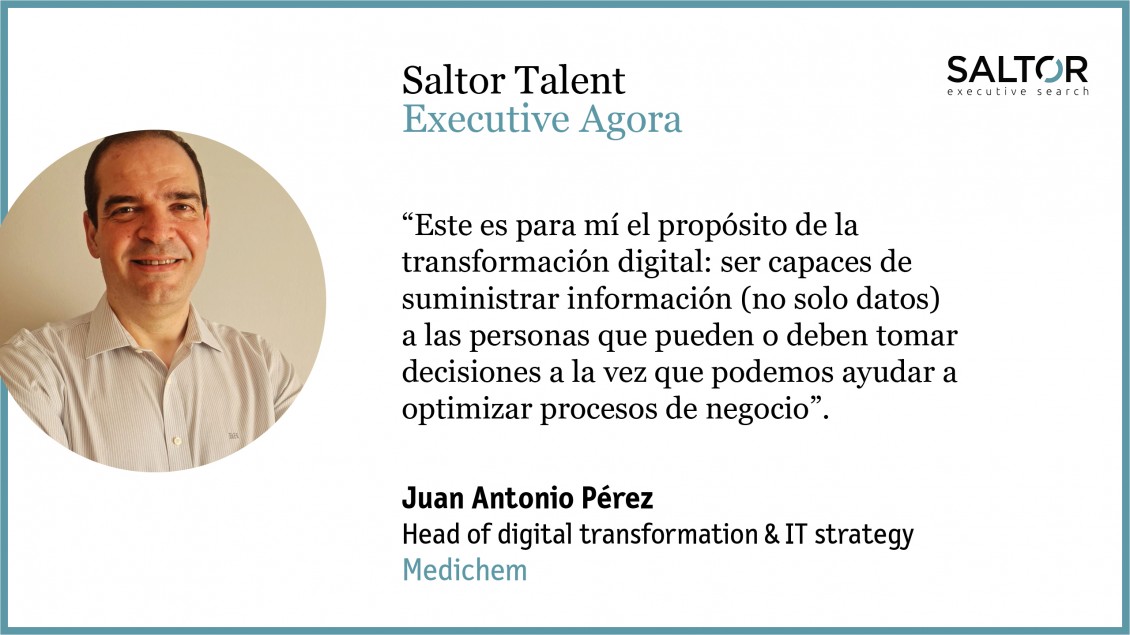
We continue with our monthly section on our website, the Saltor Talent Executive Agora, where we will interview different executives. This April we interviewed Juan Antonio Pérez, head of digital transformation & amp; IT strategy at Medichem.
Tell us briefly your professional career (training, and how your career has developed)
I have a Diploma in Management Informatics from the UPC and have completed several masters in IT Management and Business Management. I started as a teacher in a computer science school and I have evolved from a programmer, analyst, manager of the software development area, project manager and department manager. IT.
I have always bet on projects and companies that I like and that allow me to develop both professionally and personally.
You recently started a new professional challenge, as Head of IT and digital transformation of a pharmaceutical company. There is a lot of talk about digital transformation today… What are we really talking about?
Digital transformation as I conceive it serves to provide companies and people with tools that allow them to increase their productivity and that help them exploit and explore all the data that we are capable of generating in our daily work. < / p>
We are talking about a very important amount of data that until now we could not or did not know how to treat. Today with Artificial Intelligence (AI), Machine Learning (ML), Data Mining (DM) and advanced data analysis tools we can process this data and transform it into information to help decision making by predicting and modeling it. data.
This is for me the purpose of digital transformation: To be able to provide information (not just data) to people who can or should make decisions while we can help optimize business processes.
What are, in your opinion, the main technological challenges that companies must face today?
As a technological challenge I would enunciate several:
1) Security, malicious attacks on critical systems can do a lot of damage to companies, but also to society as a whole when they affect (or may affect) basic services. & nbsp; A cyberattack on the Public Service has recently occurred of Employment (SEPE) that has left thousands of people unable to process aid that is so necessary in these times COVID-19.
2) Privacy, I am particularly concerned about the large volume of data that large corporations have about us and our activities. It is clear that data can be used to help people but it can also be used to destroy them, damaging reputation, image, ...
3) Environment, digital transformation involves the use of energy to maintain and process data. Sometimes we forget how easy it is to take a photo with the mobile and upload it to social networks, but that photo takes up space on a physical medium that in turn requires energy to remain online.
4) We are facing the digital Diogenes syndrome, we all store a large amount of information that shortly after its publication is irrelevant or obsolete but which, curiously, will remain alive on the Networks for years.
Reviewing your professional career, if you look back, what have been the main learnings that you consider could help other professionals in their careers?
I think being a curious person has helped me a lot, always wanting to learn and improve. Knowing how to listen and always try to ensure that computing is seen as a tool at the service of people and not the other way around. & Nbsp; Constancy is another important value in my career. I have dedicated (and dedicate) a lot of time to training, to learning. It may seem paradoxical, but reading about philosophy and human behavior has helped me to better connect with people and to be able to explain really complex tools and systems in a “simple” way. & Nbsp; In the end, it is people who are behind the screens and that we have to help in their daily work.
